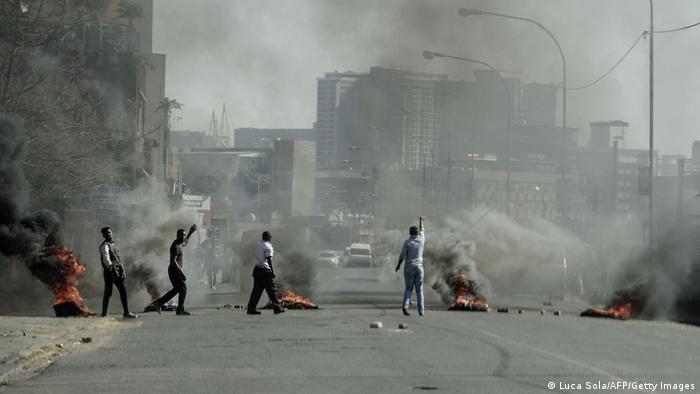Companies Count Losses After #ShutdownSA Fires and Looting
Companies in South African cities hit by the uncontrolled and unparalleled unrest which led to rioting and looting stemming from exploding frustrations about inequality and poverty, as well as the jailing of former president Jacob Zuma, are counting their losses.
With the SANDF deployed to help law enforcement deal with ongoing riots, and some of the dust and smoke beginning to clear from the initial chaos, reports of many different firms and organisations have shown that the destruction is not limited to only malls and shopping centres.

Samsung, the South Korean electronics giant has reportedly been significantly impacted by the ongoing unrest in KwaZulu-Natal (KZN). The Korea Times reports that the Samsung Electronics warehouse in KZN has been pillaged, but the Samsung plant in Durban has managed to remain untouched. The plant is also reportedly known to have “enhanced security features.”
Read also:Vodacom Business Africa Goes Trans-Atlantic, Berths in South America
“No casualties have occurred within the workforce and employees have been ordered to work from home,” an official said about the Samsung warehouse looting and ongoing unrest. Other reports confirm that some of Samsung’s service centres have also been attacked, with looters targeting consumer electronics like refrigerators and TVs.
Also affected is the LG electronics which saw the greatest damage out of the Korean firms in South Africa. The LG TV manufacturing facility in Cornubia Industrial Park in Durban has been burnt down, with its warehouses filled with TVs looted.
Though LG confirms there have been no casualties amongst employees, estimated damages could amount to around a million dollars. The facility that was destroyed employs 100 manufacturing workers.
“The company will have to figure out where it will source TV shipments as its factory burned down,” an industry official said. The destroyed factory and looted warehouse supply LG shipments to the rest of the country.
“But given the factory produces LG TVs sold in South Africa, the damage will not be great,” they said. Currently, LG is deciding whether it will set up another plant in Durban or relocate to a different region.
Read also:Nigeria’s Terragon Verified as Leader in Data and Marketing Technology
“We take the safety of our workers very seriously and would like to reassure South Africans that we are working as swiftly and with great caution as we investigate the impact of what occurred at our factory in Durban. It’s by no means an easy situation and we are working hard to ensure operations get back up and running,” said Deuk Soo Ahn, president of LG South Africa, quoted by Stuff.
Mustek, the major computer distributor was also a victim of the current violence. Last night, rioters and looters entered the company’s head office in Durban, stole everything of value and set the building alight. A video of the structure up in flames has been circulating on social media. Clearly showing both the Mustek Mecer logos brandished on the front of the building, while a blaze rages on.
“They attacked the office complex at around midday,” said Hein Engelbrecht, MD at Mustek. “They hurt the security guards badly and broke down the gate.”
Engelbrecht, quoted by TechCentral via Moneyweb, said that no employees were present when the Durban offices were attacked – the company had told employees to stay home given the volatile situation.
Farmers in South Africa have also been affected by the days of continued riots and looting, with trucks carrying produce prevented from delivering to markets. Some of the country’s highways, including the direct route from KZN to Gauteng, have been closed off.
“Farmers have already had major losses because they cannot get their products to local markets and to shops,” Christo van der Rheede, ED at the country’s main agricultural body AgriSA, said.
According to Van der Rheede, one of AgriSA’s farmers had already lost R3-million (more than $200-thousand) in perishable produce that could not be transported.
News24 reports that all sugar mills in KZN, the country’s main region for sugarcane farming, have closed after cane trucks were hijacked, mills threatened and cane farms set alight by looters.
“Around 300,000 tonnes of cane to date have been burnt [during the riots]. This is roughly R180-million ($12-million) of grower revenue,” said Thomas Funke, South African Canegrowers CEO.
The Independent Communications Authority of South Africa (ICASA) has received several reports on the vandalism of communications infrastructure across the country. According to the reports, about 113 network towers have been damaged and many community radio stations – including AlexFM, NtokozoFM, MamsFM and WestsideFM, amongst others – have been looted.
“Such wanton destruction of the broadcasting infrastructure and facilities represents a direct attack on the constitutional right of individuals and communities to access news and information that is accurate, unbiased and up-to-date about the current crisis,” ICASA said in a statement.
“Any disruption of communication services could prove disastrous and result in increased mortality as emergency calls may be directly impacted,” warned Dr Keabetswe Modimoeng, ICASA chairperson.
As the true extent of the damage caused by this almost weeklong spree of violence and looting is gradually revealed, expect more companies and organisations to report on damages and losses.
It is catastrophic sprees of unrest such as the one ongoing that developing countries struggle to ever recover from, with damaged infrastructure simply left as is without funds or manpower available for repairs.
South Africa will not emerge from this chaos unscathed. This is impossible. The real question is: will a better SA rise, or will it continue to sink deeper into the destiny that cynics have foreshadowed since the advent of democracy. The destiny of a failed state, of unstoppable violence and of irreparable inequality.
Kelechi Deca

Kelechi Deca has over two decades of media experience, he has traveled to over 77 countries reporting on multilateral development institutions, international business, trade, travels, culture, and diplomacy. He is also a petrol head with in-depth knowledge of automobiles and the auto industry

